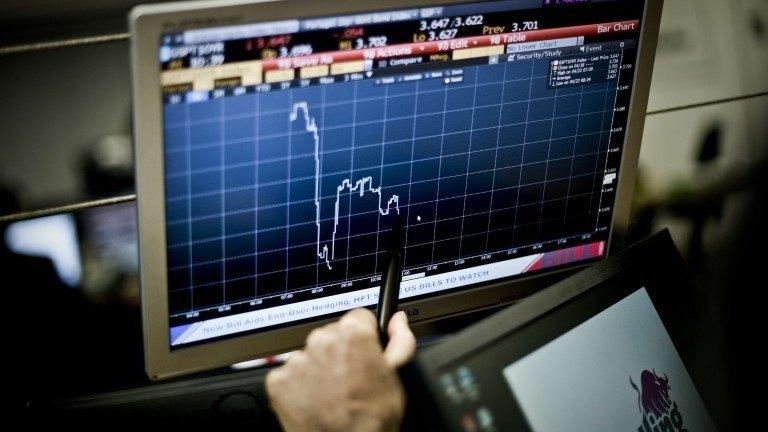Portugal's economy: Two steps forward, one step back
- Published
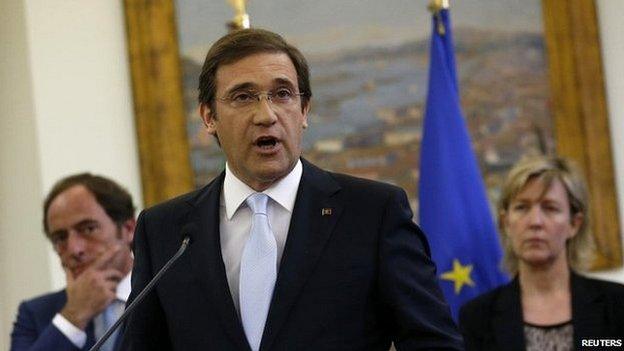
Portugal formally exits its eurozone bailout this weekend after three years of painful austerity that was the condition for it to receive 78bn euro (£63bn) in loan guarantees from the European Union and International Monetary Fund.
To mark the date, the right-of-centre government called an extraordinary cabinet meeting whose single agenda item was the approval of a medium-term economic strategy.
Opposition parties accused the governing coalition of blatant electioneering in calling the cabinet in on a Saturday, barely a week before elections for the European Parliament.
Two formal complaints were submitted to the National Elections Commission, but were struck down.
The government denies it is acting with an eye to next week's European vote, but is quite open about the fact that it is seeking to capitalise on media interest in Portugal's bailout exit.
"There will be a natural attention on the ending of the Portuguese programme," the cabinet office minister, Luis Marques Guedes, said at a briefing following Thursday's regular cabinet meeting.
"The Portuguese government intends to make use of these spotlights to make known, through the media, its strategy for reforms in the medium term."
Recovery falters
Indeed, the document was originally written in English, according to officials - as part of efforts to convince foreign investors that Portugal is back on "the path to growth".
The latest economic indicators have, however, somewhat tarnished the image of a country that has left the crisis behind.
Portugal's economic output, or gross domestic product (GDP) shrank 0.7% in the first quarter, even as euro-zone GDP swelled by just 0.2%, according to figures from Eurostat, the EU's statistical unit.
Recovery had appeared to be well under way, with the country's economy growing since the second quarter of 2013, when Portugal had the fastest growth in the EU.
Exports have been the main engine of that growth, and it was the fact that they faltered - indeed fell - in the first quarter of 2014 that send the economy into reverse.
So what is in prospect for Portugal now?
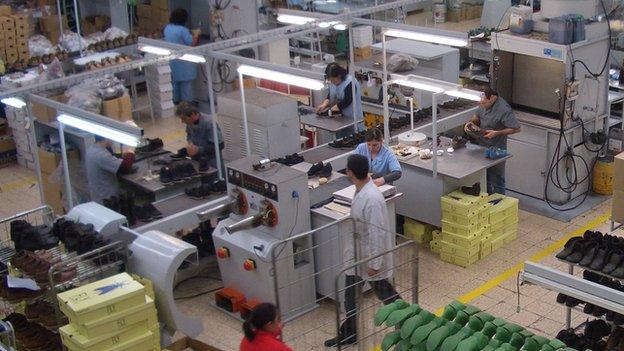
Portugal's footwear industry exports about 95% of its products
Some traditional sectors have come through the crisis fighting, with many firms responding to slumping domestic demand by looking abroad for the first time - or by seeking out non-EU markets while Europe stagnated.
The footwear industry, which exports 95% of its output, has seen its foreign sales jump by some 40% over the past four years, and the pace of growth has continued in recent months.
Brands such as Fly London, which despite its name is produced by a company based in Guimaraes in northern Portugal, exemplify a move upmarket by many Portuguese shoe manufacturers - a trend that has lifted their average sale price to a point at which they rank behind only those made in Italy.
Tourism has also been growing strongly, particularly in the capital, with an increasing diversification away from traditional beach holidays in the Algarve - and this summer is expected to set a new record in terms of visitor numbers.
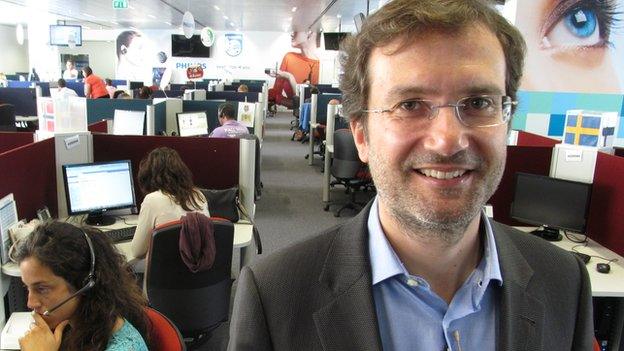
Portugal's prospects are looking better, says Teleperformance Portugal's Joao Cardoso
Exports 'growing very fast'
Some other services are also doing well. Teleperformance Portugal, the country's largest contact-centre operator, has maintained its pace of doubling in size roughly every three years even in the crisis, according to its chief executive, Joao Cardoso.
The company's innovative approach, not only to customer service but also to helping its local and multinational clients make improvements in their businesses, has won it a string of international awards.
"The world is so open that we now have more opportunities than at any time in the past," says Mr Cardoso.
"Portugal is very favourable for this kind of service."
Not only is it relatively easy to persuade native English, German, Swedish or Dutch speakers to move to sunny Portugal, but the company can draw on a large Portuguese diaspora whose members grow up speaking at least two languages.
One-fifth of the 800 people it has hired from abroad in the past two years are emigrants or the children of emigrants.
Mr Cardoso is optimistic about his country's prospects, too.
"Portugal's economy is very open - and exports have been growing very fast.
"People are more optimistic now and that means they will take more risks."

Many still object to the government's austerity measures
Unemployment still high
So far as taking risks goes, the 120,000 Portuguese who the government estimates left the country last year in search of work, are certainly proof that there is a widespread readiness to do so.
Portugal's jobless rate has been falling very gradually, but at 15.2% it is still twice the level of a decade ago, and youth unemployment actually rose slightly in March - to a shocking 35.4%.
As for the kind of risk that worries investors, international ratings agencies have of late been making positive noises about the outlook for Portugal, but all still rate its sovereign debt as "junk".
While its bond yields are at their lowest levels in years, that is in part because of investors' frantic search for decent returns - and the famously reassuring words back in 2012 of the European Central Bank's president, Mario Draghi, that it would do "whatever it takes" to ensure the euro's survival.
Economist differ on whether Portugal's debt mountain - which the government says will peak this year at 127.5% of GDP - is sustainable.
But they do agree that the country's ability to bear and ultimately reduce this burden will depend on the future pace of economic growth.
- Published22 March 2024
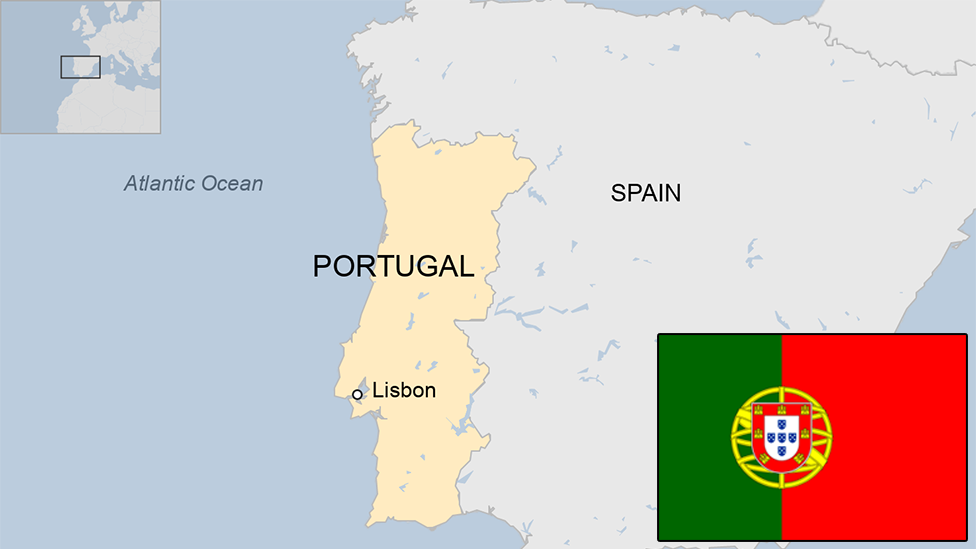
- Published4 May 2014
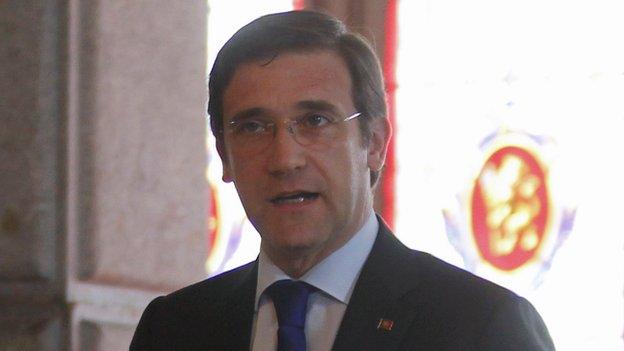
- Published23 April 2014
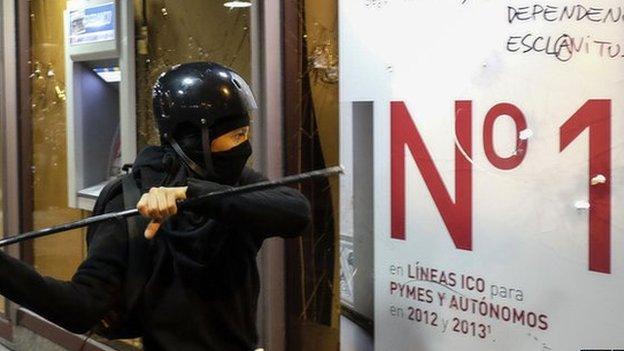
- Published23 April 2014
